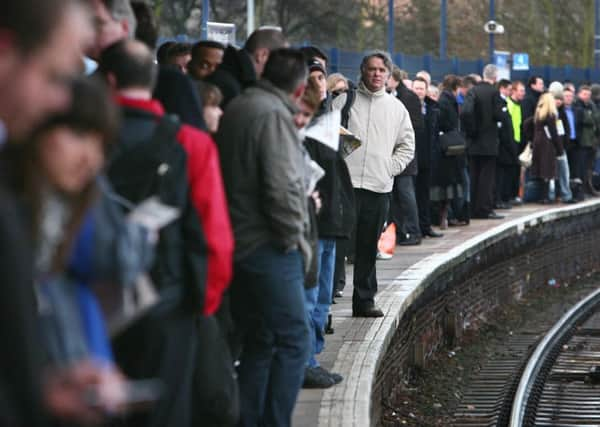Tom Richmond: Fed up with overcrowding on the trains? Consider yourself lucky...


Despite being recommended for closure, people power helped to save the Wharfedale Line between Leeds and Ilkley. Other routes, however, were less fortunate and became victims of the most short-sighted transport policy in history.
Fast forward 50 years and “luck” is not the first word that springs to mind as dozens of commuters at Guiseley Station scramble onto an early-morning train into Leeds. “Move down the carriage,” shouts one exasperated lady from the platform as she wonders whether she will actually get on the train.
Advertisement
Hide AdAdvertisement
Hide Ad“We have done,” retorts a sharp-suited business executive as all those standing draw a sharp intake of breath so the final passengers can climb aboard the 7.52am into Leeds. This is the human equivalent of cattle class as strangers cling onto each other for balance – there would be outrage if animals were transported in such a confined space. I console myself with the fact that it is not a stifling summer’s day and the air-conditioned carriages are modern in comparison to the rattle-traps on the Harrogate line.
This “standing room only” experience is not unique – it is just a snapshot of the conditions that millions of commuters endure as demand for the railways reaches record levels that Beeching and his cohorts, like Harold Macmillan’s lieutenant Ernest Marples, failed to foresee in the 1960s.
It also explains why the newly-elected Labour leader, Jeremy Corbyn, wants to renationalise the railways – he believes rush-hour overcrowding stems from the fact that the privatised train companies, largely foreign-owned, have not put sufficient money back in.
Many of those squashed like proverbial sardines on the 7.52am will probably concur. Northern, one of the first franchises Labour would return to the public sector, is a joint venture between Serco and Dutch-based Abellio. Yet the only reason that the Corbyn approach, the so-called “people’s railway”, is gaining traction is because the railway industry invariably forgets that it is in the business of providing a service, subsidised by the taxpayers, and continues to regard passengers as an unhelpful inconvenience.
Advertisement
Hide AdAdvertisement
Hide AdHowever it is simply impossible to run longer trains – the platforms are not long enough – or more services, because the network is already at capacity. Since privatisation in the mid-1990s, the number of annual passenger trips has doubled from 801 million to 1.65 billion.
Take the Wharfedale Line. It passes through a tree-lined cutting near Guiseley with only room for a single track. The service is constrained to two trains an hour in each direction. Unless this is addressed, the overcrowding will only become more chronic as more new houses are built, including those due to be served by the Kirkstall Forge station now under construction.
Why does this matter? On the day of my early-morning trip, Lilian Greenwood, the newly-appointed Shadow Transport Secretary, gave a totally disingenuous interview. Blaming the Tories for everything, she failed to explain whether renationalisation would lead to cheaper fares – or increased capacity.
“There is an opportunity to make more efficiency savings,” she said lamely. Ms Greenwood cannot blame her lack of knowledge on being a political novice – she held a shadow transport brief under Ed Miliband. Indeed, I wasn’t the only person to be left bewildered; the pundit Kelvin MacKenzie was incredulous. “She doesn’t know anything,” he concluded with uncharacteristic politeness.
Advertisement
Hide AdAdvertisement
Hide AdIn fairness Edward Welsh, speaking on behalf of the Rail Delivery Group which represents operators and Network Rail, fared little better. He seemed to think the £750m redevelopment of Birmingham New Street station, complete with John Lewis superstore, was the answer. Really? Try telling that to those passengers in parts of the country that have not been beneficiaries of the West Coast Main Line upgrade – most stations do not have the scope to become shopping centres.
What this does demonstrate, however, is the need for co-ordinated public and private sector investment. British Rail was losing £2bn a year when put out of its misery, and its record on punctuality and reliability was no better than operators like Northern.
Equally, the Government’s emphasis on high-speed rail must not detract attention away from the need to invest in more local services – whether it be upgrading the Wharfedale Line for example or looking again at the case for reviving lines from Beverley to York, Harrogate to Ripon and Skipton to Colne to name three examples.
Rather than this stop-start approach to policy-making, there needs to be a local, regional and national plan for the next five, 10 and 20 years – and then a discussion on what is attainable from a financial and logistical point of view. In many respects, the Beeching cuts represented a failure to look to the future. It is important that the same mistake is not repeated.
Advertisement
Hide AdAdvertisement
Hide AdIf not, passengers won’t be left stranded at stations because there’s no demand for trains. They will be left there because there’s no room – not even in cattle class. How ironic 50 years after Beeching stopped rail travel in its tracks.